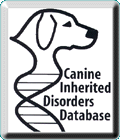
Coagulation (bleeding) disorders
Normally the body responds to an injury that causes bleeding through a complex defence system. This consists of local changes in the damaged blood vessels, activation of blood cells called platelets, and the coagulation (clotting) process. Most inherited bleeding disorders are the result of abnormal platelet function or a deficiency in one or more of the factors involved in the blood clotting system. The most serious and common inherited coagulation disorders in dogs are hemophilia(deficiency of factor VIII or IX) and von Willebrand's disease (lack of von Willebrand factor).
Other coagulation disorders are discussed here. These abnormalities of specific clotting factors are much less common and usually cause a milder type of bleeding disorder. Inherited deficiencies of factors I (fibrinogen), II (prothrombin), VII (proconvertin), X (Stuart factor), XI (PTA), and XII (Hageman factor) have been identified, most commonly in purebred dogs but also in mixed breed dogs.
Other than hemophilia, disorders of clotting factors are inherited as autosomal traits, primarily autosomal recessive. These uncommon deficiencies have been identified in the following breeds: Factor I (hypofibroginemia) - Saint Bernard; factor II - boxer; factor VII - beagle; factor X - American cocker spaniel, Jack Russell terrier; factor XI - springer spaniel, Great Pyrenees, Kerry blue terrier; factor XII - miniature poodle
Factor XII deficiency generally causes no problems and is only discovered if coagulation testing is done.
Deficiencies of factor VII or XI tend to cause mild disease. You may notice that your dog bruises easily or has nosebleeds. There is often prolonged bleeding after surgery or trauma and, with major surgical procedures or trauma, bleeding may be severe.
Deficiencies of factor I, II or X are rare; however they cause severe bleeding problems. Factor X deficiency causes stillbirths or "fading puppies" that only live for a few weeks.
A deficiency of factor XII usually causes few problems and is only discovered incidentally if coagulation testing is done. Deficiencies of factor VII or XI may only be discovered when surgery is performed or if your dog is in an accident. In both these cases there will likely be increased bleeding which can be slow in onset and difficult to control, and your veterinarian will suspect a coagulation disorder. Special screening tests are required to diagnose the specific clotting factors involved.
For the veterinarian:
SCREENING TESTS: The mucosal bleeding time is normal for all factor deficient patients, although there may be rebleeding. Coagulation screening tests (citrate sample) will localize the defect further to the extrinsic, intrinsic, or common pathway. Definitive diagnosis requires an assay for specific factors. Specific factor assays can also be used to screen for carriers (heterozygotes), who have a reduced amount of normal factor activity. (Consult your diagnostic laboratory for specific information about sample collection and submission.)
CLINICAL: With factor XI deficiency in particular, onset of bleeding after surgery or trauma may be delayed up to 48 hours, and hemorrhage may be severe.
A dog with a factor XI deficiency may require one or more blood transfusions if there is severe bleeding after surgery or an accident.
For the veterinarian:
If there is a severe bleeding episode, administer fresh or fresh-frozen plasma. Transfused factors have a relatively short half-life, so plasma may need to be transfused every 8 to 12 hours until the bleeding stops. Fresh whole blood may be used but it must be carefully cross-matched to prevent future transfusion reactions. If a dog has been diagnosed with a factor XI deficiency, fresh or fresh-frozen plasma should be administered before any major surgery.
FOR MORE INFORMATION ABOUT THIS DISORDER, PLEASE SEE YOUR VETERINARIAN.
Affected dogs should not be used for breeding, and parents and siblings should be carefully screened for these traits. It is possible to detect carriers, based on the levels of factor activity. Many cocker spaniel breeders for example, have had their breeding dogs tested for factor X deficiency, reducing the frequency of this harmful gene in the cocker spaniel population.
Brooks MB. 1998. Hereditary bleeding disorders. ACVIM-Proceedings of the 16th Annual Veterinary Forum:424-426. This reference has information on diagnosis/screening tests for specific coagulopathies, genetic counselling, and carrier detection.
Brooks MB. Hemophilias and other hereditary coagulation factor deficiencies. In: Côté E, ed. Clinical Veterinary Advisor Dogs and Cats. Missouri: Mosby Elsevier, 2007:482-3.
Sargan DR. Coagulation disorders in IDID - Inherited diseases in dogs:web-based information for canine inherited disease genetics. Mamm Genome. 2004 Jun;15(6):503-6.
- Disorder Type:

